Past Undergraduate Internship Projects
The Bioenergy and Sustainability School Summer Internship Program was led by Dr. Ann Wilkie of the Department of Soil, Water, and Ecosystem Sciences from 2006 to 2018. The internship program was sponsored by the Florida Agricultural Experiment Station, with funding from the IFAS Dean of Research. The intent of the program was to introduce undergraduates to bioenergy research and foster interest in future graduate studies.
Through a paid internship, students were provided with an opportunity to learn about current trends in bioenergy and participate in basic and applied research related to bioenergy. The program included a combination of lectures, field trips, seminars, discussion sessions, and group/individual research projects.
-
2018 Internship Program
Interns
Brett Higgins
Sophomore, Microbiology and Cell Science
College of Agricultural and Life Sciences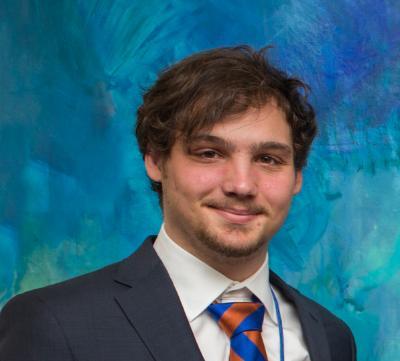
_______________________________________________________
-
2017 Internship Program
Blog
Sustainability and Solar Energy – My Summer Internship Experience
Individual Projects
Solar Cooking for Disaster Relief
By Lars Bjorndal
-
2016 Internship Projects
Individual Projects
Bat Guano, More Than an Organic Fertilizer
By Blaze Walsh
__________________________________________________________________
Lab-scale Cultivation of Spirulina on Landfill Leachate
By Erica Winstead
__________________________________________________________________
Methane Potential of Indigenous Algae
By Gillian Palino
__________________________________________________________________
Carbon Capture and Utilization - The Algal Way
By Josh Goff
-
2015 Internship Projects
Individual Projects
Postharvest Storage Potential of Industrial Sweetpotato Roots and Culls
By Jenna Curtis
__________________________________________________________________
Methane and Nutritional Potential of Industrial Sweetpotato
By Cabbar Dundar
__________________________________________________________________
Effect of Abscisic Acid on Chlorella vulgaris Growth and Lipid Yield
By Gary Jones
__________________________________________________________________
Opportunity Feedstocks for Biogas Production
By Gage LaPierre
__________________________________________________________________
Evaluating a Plant-Based Flocculant for Microalgae Biomass Harvesting
By Marie Peralt
__________________________________________________________________
Backyard Biogas Production
By Shane Philhower
-
2014 Internship Program
Interns
Michael Bank
Senior, Biotechnology
College of Agricultural and Life Sciences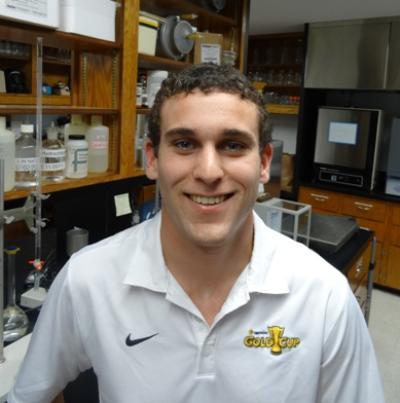
My Name is Michael Bank. I am a senior majoring in Biotechnology with a minor in Fisheries and Aquatic Sciences. I am very interested in how biological processes help solve societal problems such as energy and food security. This summer I will be working with algae with the hope of advancing the techniques used to create algal biofuels. I will also be investigating the production and use of charcoal for soil remediation and carbon sequestration.
_______________________________________________________
Natalie Chavez
Senior, Environmental Science
College of Agricultural and Life Sciences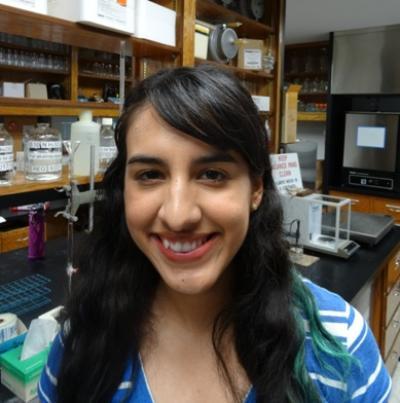
My name is Natalie Chavez, I am a senior in Environmental Science with a minor in International Studies. I am interested in anaerobic digestion and maximizing biogas production by finding a feedstock with an optimal methane yield. This process is intriguing to me by being able to use waste as an alternative energy. Waste consumption is prominent in our society and I am interested in the progress of sustainable waste-to-energy systems. I enjoy traveling and would love to travel to other countries to apply the skills I will learn from this experience because renewable energy is valuable for our future.
_______________________________________________________
Luiza Costa
Junior, Natural Resource Conservation and Sustainability Studies
College of Agricultural and Life Sciences and the College of Liberal Arts and Sciences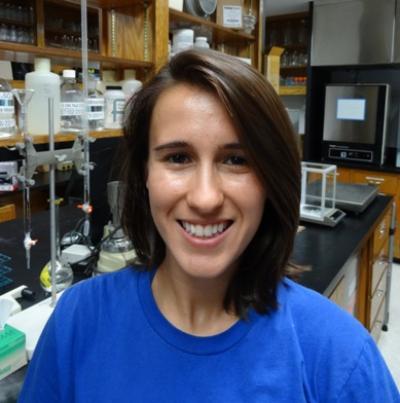
My name is Luiza Costa, I am a junior Natural Resource Conservation and Sustainability Studies majors in the College of Agricultural and Life Sciences and the College of Liberal Arts and Sciences. I am originally from Brazil but have been living in Boca Raton Florida for the past eleven years. I am interested in anaerobic digestion to reduce waste while simultaneously producing a renewable energy source. I am interested in spending the rest of my life exploring innovative ways to make the world a better place and reducing the impact civilization has on the planet.
_______________________________________________________
Kimberly Hafner
Junior, Biological Engineering
College of Engineering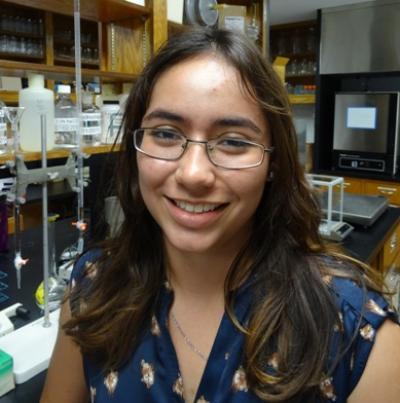
My name is Kimberly Hafner. I am a Biological Engineering major with a focus in Biosystems. After graduation, I plan on attending graduate school to pursue a PhD. I am interested in global sustainability with a particular interest in utilizing waste as a fuel. For my summer research project, I plan on working with microalgae for nutrient removal from wastewaters and biofuel production.
_______________________________________________________
Brett Nelson
Senior, Environmental Science
College of Agricultural and Life Sciences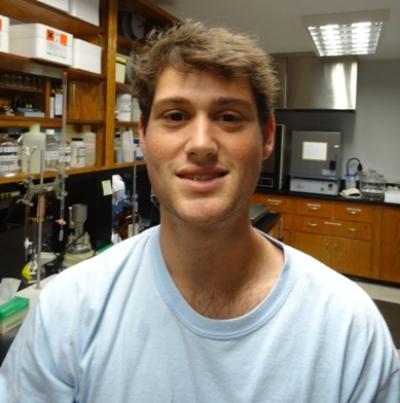
My name is Brett Nelson. I am a senior at UF, from Rockville, Maryland. I plan to graduate in May 2015 with a B.S. in environmental sciences and a minor in business administration. I am interested in renewable energy and the conversion of algae to biofuels. For my summer research project I plan to grow algae on different mediums and hope to observe a difference in lipid production. My goal is to find an optimal medium for growing algae with maximum lipid content.
_______________________________________________________
Alec Spaulding
Post-baccalaureate, Family, Youth, and Community Science
College of Agricultural and Life Sciences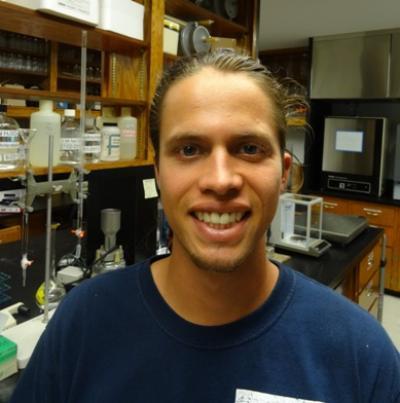
The idea of Sustainability has taken root across disciplines and locations. We need to utilize the human penchant for pattern recognition to develop cyclical systems that don’t deplete our resources. My studies have prepared me to enact community development through environmentally-friendly solutions. I view anaerobic digestion as part of such a holistic approach, and seek to learn how this method fulfills a sustainable food system. My research this summer will be oriented towards the issues faced in a particular community in Haiti. By teaching people the fundamentals of nutrient cycling, I believe we can empower them with the mental tools necessary to resolve problems with awareness and foresight.
-
2013 Internship Program
Interns
Nury Dominguez
Senior, Food and Resource Economics
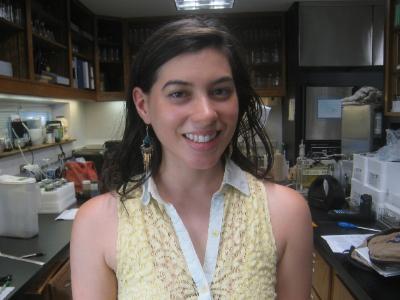
I am Nury Dominguez, a senior at UF who is from Hialeah, Fl. I am a Food and Resource Economics Major, and I graduate in May 2014. After graduation I hope to join Teach for America to teach children about Math and Science. I plan to attend graduate school for Finance. I am interested in social change and emphasizing the importance of sustainability to society as a whole, especially to younger generations. My interests include composting, production of biofuels from algae and oil crops, as well as organic horticulture. I am working on an interesting species of algae that was isolated by Dr. Ann Wilkie in 2009. I hope to grow the algae on anaerobic dairy lagoon effluent, as well as landfill leachate and permeate.
_______________________________________________________
Steven Kanner
Post-Baccalaureate, Environmental Science
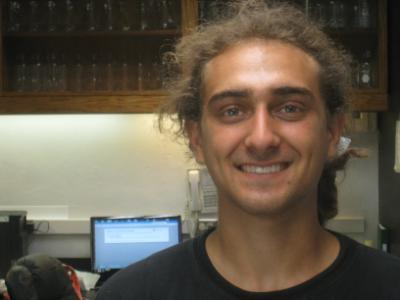
My name is Steven Kanner. I graduated from UF in May 2013 with a B.S. in Environmental Science and a minor in Business Administration. I have been active in developing two start-up businesses in the last few years focused on sustainable solutions to transportation and food waste diversion in the urban environment. "Gainesville Compost" is a bicycle powered food waste diversion service for restaurants in Gainesville, FL and KannerKarts LLC is a custom bicycle trailer manufacturer with the goal of sustainable local transportation solutions. As an intern this summer, I will be using a new in-vessel composter to compare its output material to other composting methods. I am passionate about sustainability and i enjoy cycling, fabrication, and the outdoors.
_______________________________________________________
Corina Lee
Senior, Environmental Science
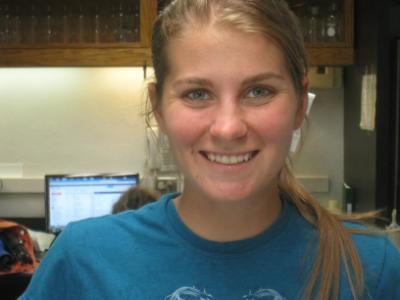
My name is Corina Lee. I am a senior in Environmental Science with a minor in Geography. I plan on graduating in the Spring of 2014. I am currently interested in the feasibility of utilizing various waste waters as mediums for algae growth, specifically spirulina. I will be experimenting with a multitude of factors within the wastewater that could inhibit spirulina growth. My other interests include reading, cooking, and traveling.
_______________________________________________________
Cary Putnal
Senior, Sustainability Studies
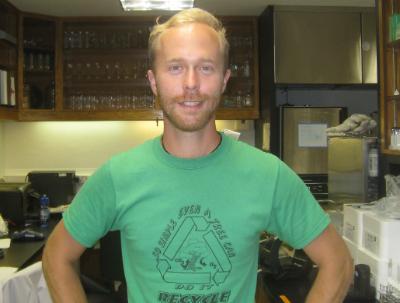
A myriad of microorganisms exist practically everywhere in our world. We use some of them to ferment our beverages, pickle our foods, and even to decompose our food wastes. I believe they are one of our most underutilized resources in the global effort to become sustainable. As an undergrad student focusing on Sustainability at the University of Florida, I have been challenged to consider alternatives to popular technologies and habits of energy use. My studies also include sustainable crop production and, by extension, composting. In addition to this, I worked as a seasonal park ranger for the US National Park Service and have developed a background in conservation. I also have many years of experience brewing beer and fermenting wine.
_______________________________________________________
Alec Shoelson
Senior, Wildlife Ecology and Conservation
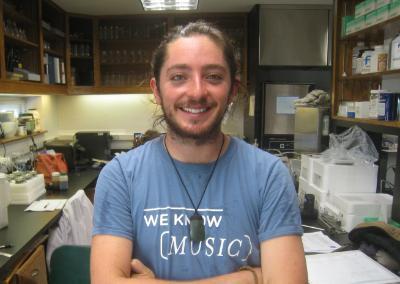
My name is Alec Shoelson, I am a Wildlife Ecology and Conservation major with minors in Sustainability and Fisheries. After graduation I hope to further advance my education in sustainable fisheries. My independent research in the summer school involves the cultivation a species of algae known as Haematococcus. Haematococcus is highly prized for the pigment astaxanthin it produces when stressed. Astaxanthin is renouned as a nutritional supplement for its antioxidant and beneficial properties. It also plays a huge role in salmonid fisheries as it is responsible for giving their flesh their signature pink hue. I will work on cultivating Haematococcus on different mediums and waste waters to see if it has potential for bioremediation.
-
2012 Internship Projects
Group Project
Decomposing with Gainesville Compost: BEST Lab Community Outreach Project
Individual Projects
Optimization of Nutrient Medium for Permeate Remediation
By Adrian Brene
Fungal Decay: Using Fungi as a Biological Pretreatment for Anaerobic Digestion
By Leslie Johnson
Co-digestion of Used Cotton Clothing
By Allison Kelly
Impact of Various Artificial Substrata on Filamentous Algae Entrapment and Growth
By Henry Legett
Cultivation of Filamentous Algae Spheroids
By Tommie Brent Lovato
Anaerobic Digestion of Horse Stall Waste
By Sarah Luther
Waste Activated Sludge as a Feedstock and Inoculum for Anaerobic Digestion
By Candice Prince
Design of an Airlift Column Photo-Bioreactor that Increases Remediation Rates of Reverse Osmosis Permeate
By Jose St Louis
-
2011 Internship Projects
Group Projects
Small Farm waste audit
By Chelsea Brown, Jaquelyn Neal, and Tim Sink
Algal remediation of landfill permeate
By Carlos Lopez, Sinclair Vincent, and Kalvin Weeks
Individual Projects
Recovery of methanol from waste glycerol
Improving the Sustainability of Biodiesel Production (Poster)
Undergraduate Research Symposium
March 28, 2012
By Chelsea BrownPhycoremediation of landfill permeate: microalgae vs. filamentous algae
Phycoremediation of Landfill Permeate: Nurtient Limitation (Poster)
Undergraduate Research Symposium
March 28, 2012
By Carlos LopezTomatoes from tomatoes
Using the Effluent of Anaerobically Digested Tomatoes to Fertilize Plants (Poster)
Undergraduate Research Symposium
March 28, 2012
By Jacquelyn NealAnaerobic digestion of culled tomatoes to produce biogas
By Tim Sink
Phycoremediation of landfill permeate: a mini life cycle analysis
Algal Bioremediation of Landfill Leachate (Poster)
Undergraduate Research Symposium
March 28, 2012
By Sinclair VincentMicroalgae growth on crude glycerol
By Kalvin Weeks
-
2010 Internship Projects
Group Projects
Waste Auditing
By David Estrine, Flora Vinson, James Sutton, David Sutton and Ryan Graunke
Phycoremediation of Landfill Leachate
By Kaitlyn Summerfield, Lindsy Iglesias, and Grier Phillips
Individual Projects
The Role of Restaurants in Organics Recycling
By David Estrine
Deployable Digesting Toilet
By David Sutton
Anaerobic Digester Effluent as a Pretreatment for Waste Paper
By Flora Vinson
Generating Energy from Brewery Wastes
By James Sutton
Algae & Water Hyacinth
By Grier Phillips
Tolerance comparison of Chlorella sp. [ACW1] and Brassica chinensis to human urine
By Lindsy Iglesias
Breaking Algal Cells for Bioresource Extraction
By Kaitlyn Summerfield
-
2009 Internship Projects
Student Projects
Eric Layton
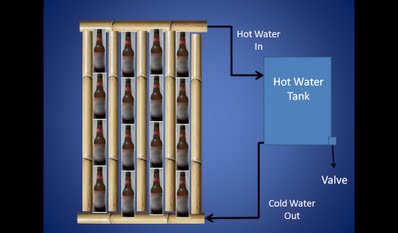
Eric's project involved building a solar water heater that can be portable and can be used in developing countries.
Taylor Norrell
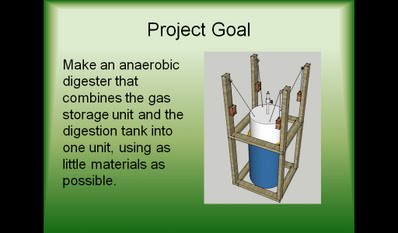
Taylor's project involved creating a bag anaerobic digester with a unique biogas collection system.
Christa Rummel
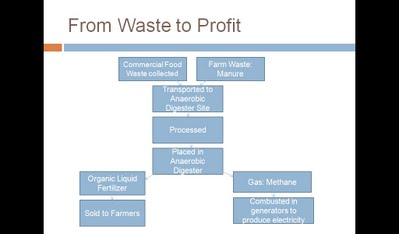
Christa's project involved creating a business plan for a company that collects food waste, anaerobically digests this waste, and then uses the biogas to create electricity to be put back into the electrical grid. She created a Powerpoint as part of her research project.
Danielle Keeter
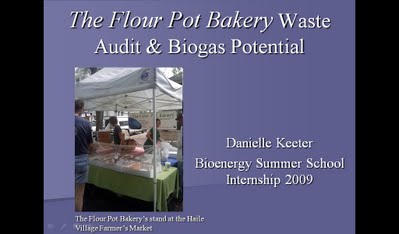
Daniel's project was to study the waste stream from The Flour Pot Bakery in Gainesville, FL. She studied the organic waste stream of mainly bread products and the potential to anaerobically digest the food waste.
Divik Schueller
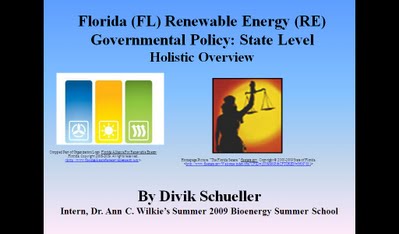
Divik's project involved researching alternative energy policy in Florida. He also assisted with building a solar thermal panel with Eric Layton.
Chris Rummel and Taylor Norrell
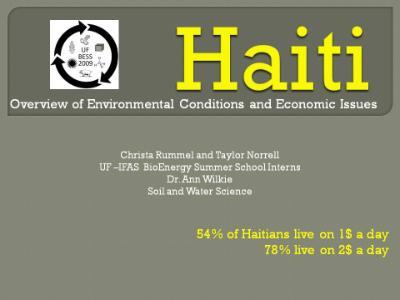
Christa and Taylor developed a presentation about the environmental and economic conditions faced by Haiti.
-
2008 Internship Projects
Group Projects
Small-scale Oil Press
The purpose of this project was to design a small-scale oil press suitable for oil crops such as soy, peanut, sunflower and Jatropha, to advance sustainable, locally ranged biodiesel production.
Jatropha Seed Germination
The Bioenergy Summer School Interns collected different types of Jatropha seeds to experiment with several germination methods.
Biodiesel from Waste Vegetable Oil
-
2007 Internship Projects
Group Projects
Energy Garden
The interns planted patches of peanut and sunflower to generate oil from the crop seeds for the production of biodiesel.
Krishna Lunch Waste Project
The interns collected waste from the Krishna Lunch on the Univesity of Florida campus, during most of July. The experiment continued as the waste was composted and digested.
-
2006 Internship Projects
Group Projects
Organic Waste Streams at the University of Florida
Jen Fallon and Charlene VolpeSolar Thermal Collectors and Application
Shunpei Iguchi and James Duncan
Individual ProjectsAnaerobic Digestion of Biodiesel and Biodiesel Waste Products
James DuncanBiodiesel Survey
Jennifer FallonBiogas Production Using Small Scale Biodigester
Shunpei IguchiWastewater Characteristic Post Anaerobic Treatment, A Study on the Digestibility of UF Reclamations Facility Raw Wastewaters and Biosolids
Sugar Subsidies
Charlene Volpe
